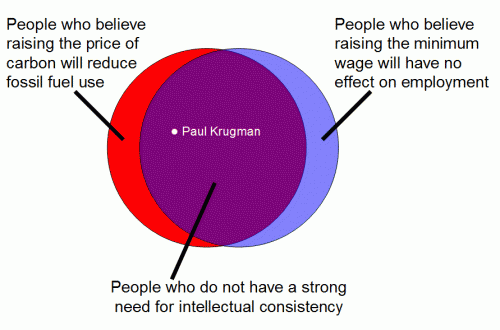It does not appear that Rick Perry is the guy to dismantle our growing corporate state.
The LA Times investigates the big-money culture of Texas politics, which has gotten even bigger and money-er since Rick Perry became governor:
Perry has received a total of $37 million over the last decade from just 150 individuals and couples, who are likely to form the backbone of his new effort to win the Republican presidential nomination....Nearly half of those mega-donors received hefty business contracts, tax breaks or appointments under Perry, according to a Los Angeles Times analysis.
Perry, campaigning Monday at the Iowa State Fair in Des Moines, declined to comment when asked how he separated the interests of his donors from the needs of his state. His aides vigorously dispute that his contributors received any perks. "They get the same thing that all Texans get," said spokesman Mark Miner.
Nearly half! And this doesn't even include anything about David Nance and the largesse Perry distributes via his $200 million state-managed venture capital slush fund. Doling out political favors in industrial quantities is obviously something that isn't frowned upon by Texas political culture, and Perry has taken it to whole new levels.
Kudos to the LA Times and folks like Kevin Drum for digging this up, but everyone involved should be embarrassed by just how partisan outrage on this kind of thing can be. The same folks who are rightly upset at Perry actively cheered on Obama as he took ownership of GM away from the secured creditors and handed it to his major campaign supporters in the UAW. His stimulus program has been a trillion dollar slush fund to pay off nearly every liberal constituency, and while I find the idea of a state-run venture capital fund horrifying, I see no difference here with Obama's green job investments, many of which have gone triends, campaign supporters, and even spouses of prominent administration officials.
As I asked the other day, if the President is really supposed to be our VC in chief (an absurd thought) who in the hell would pick Obama for the job? As one random example out of my feed reader:
Last year, Seattle Mayor Mike McGinn announced the city had won a coveted $20 million federal grant to invest in weatherization. The unglamorous work of insulating crawl spaces and attics had emerged as a silver bullet in a bleak economy – able to create jobs and shrink carbon footprint – and the announcement came with great fanfare.
McGinn had joined Vice President Joe Biden in the White House to make it. It came on the eve of Earth Day. It had heady goals: creating 2,000 living-wage jobs in Seattle and retrofitting 2,000 homes in poorer neighborhoods.
But more than a year later, Seattle's numbers are lackluster. As of last week, only three homes had been retrofitted and just 14 new jobs have emerged from the program. Many of the jobs are administrative, and not the entry-level pathways once dreamed of for low-income workers. Some people wonder if the original goals are now achievable.
"The jobs haven't surfaced yet," said Michael Woo, director of Got Green, a Seattle community organizing group focused on the environment and social justice.
"It's been a very slow and tedious process. It's almost painful, the number of meetings people have gone to. Those are the people who got jobs. There's been no real investment for the broader public."
At the same time, heavily subsidized Evergreen Solar is going bankrupt.
Bloomberg News reports that the firm Evergreen Solar will file for bankruptcy and close its operation in Midland, Mich. The maker of solar cells cites over-capacity in the industry, competition from China and fewer government subsidies as contributing factors. According to Bloomberg, the firm has 133 employees worldwide.
Given a Michigan location and participation in a politically faddish industry, readers won't be surprised that Evergreen was the beneficiary of special state subsidies and a local tax break. Specifically, three years ago Evergreen Solar was offered a $1.8 million "refundable" tax credit by the Michigan Economic Growth Authority. For firms with little or no tax liability, this amounts to an outright cash subsidy, contingent on attaining certain employment and investment milestones. Evergreen Solar's specific tax liability is not public information.
The deal was based on crystal-ball projections from the Michigan Economic Development Corporation using a software program known as REMI, which predicted that an Evergreen deal would create exactly 596 direct and "spin-off" jobs by 2018, producing $18.5 million in new state tax revenue.
The city of Midland also granted property tax abatements worth $3.9 million over 12 years, according to Mlive.com. It's not known how much, if any, of these subsidies and tax breaks were ever collected by the company.
This actually understates the total subsidies, as it ignores subsidies to its customers, incoluding above market geed-in tariffs, to buy the solar panels.
Closer to home, a Tucson solar panel manufacturer that was opened to great fanfare with the help of Janet Napolitano and Gabby Giffords just closed after being open barely 2 years. They scored some subsidies, got some large government and utility contracts on the promise of local employment, and then packed up shop for China. Apparently they were attempting to compete in the commodity solar panel market on a strategy of having a higher fit and finish on their product, a product that sits on the roof and no one ever looks at. Good plan.
PS- Yes, private investments fail all the time, but they are 1) not using my money, unless I voluntarily offer it and 2) there are real consequences for those who make bad investments
